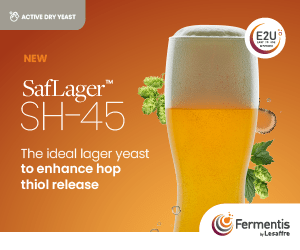Flanders Red Recipe
Flanders Red
(5 gallons/19 L, all-grain)
OG = 1.057 FG = 1.008 IBU = 16 SRM = 15 ABV = 6.5%
Ingredients
5.3 lbs. (2.4 kg) Vienna malt (4 °L)
5.3 lbs. (2.4 kg) continental Pilsner malt (2 °L)
8.5 oz. (0.24 kg) aromatic malt (20 °L)
8.5 oz. (0.24 kg) caramel Munich (60 °L)
8.5 oz. (0.24 kg) caramel Munich (120 °L)
3.5 AAU Kent Goldings hops (60 min.) (0.7 oz./20 g at 5% alpha acid)
Irish moss (15 min.)
1 oz. (28 g) medium toast
French oak cubes (added in secondary)
Wyeast 3763 (Roeselare Blend) or White Labs WLP655 (Belgian Sour Mix I) yeast
Step by Step
I currently use Best Malz Pilsen and Vienna, but feel free to substitute any high quality malt of the same type and color from a different supplier. The Aromatic® malt is from Briess and the two types of caramel Munich are from Franco-Belges. My hops are in pellet form and come from Hop Union, Willamette Valley, or Hopsteiner depending on the variety. Mill the grains and dough-in targeting a mash of around 1.5 quarts of water to 1 pound of grain (a liquor-to-grist ratio of about 3:1 by weight) and a temperature of 154 °F (68 °C). Hold the mash at 154 °F (68 °C) until enzymatic conversion is complete. Infuse the mash with near boiling water while stirring or with a recirculating mash system raise the temperature to mash out at 168 °F (76 °C). Sparge slowly with 170 °F (77 °C) water, collecting wort until the pre-boil kettle volume is around 6.5 gallons (25 L) and the gravity is 1.044. The total wort boil time is 90 minutes, which helps reduce the S-Methyl Methionine (SMM) present in the lightly kilned Pilsner malt and results in less Dimethyl Sulfide (DMS) in the finished beer. Add the hops with 60 minutes remaining in the boil. Add Irish moss or other kettle finings with 15 minutes left in the boil if you please. Chill the wort to 68 °F (20 °C) and aerate thoroughly. For this beer, I like a pitch rate of two packages of the liquid yeast blends. I’m not sure what that pitch rate is, given the mixed nature of these cultures, but I like the results. Ferment around 68 °F (20 °C) until the yeast drops to the bottom and forms a layer. With healthy yeast, this should be complete in two weeks or less, but there is no need to rush it. Rack the beer to a smaller secondary container, add the oak cubes, and close with a very slightly permeable closure, such as a carboy cap. Place in a spot protected from light and check every couple of months to see how your baby is coming along. It can easily take a year or more to fully develop. Be patient. When the beer has developed the character you desire, you can rack to a keg and force carbonate or you can add priming sugar and a fresh dose of yeast to carbonate in the bottle. Be careful, if you bottle too early, there could still be significant sugars present for the Brettanomyces to continue to consume. Once the beers are carbonated, store in the refrigerator to prevent bottle bombs. Target a carbonation level of 2 to 2.5 volumes.
Flanders Red
(5 gallons/19 L, extract with grains)
OG = 1.057 FG = 1.008 IBU = 16 SRM = 17 ABV = 6.5%
Ingredients
7.2 lbs. (3.25 kg) Munich liquid malt
8.5 oz. (0.24 kg) aromatic malt (20 °L)
8.5 oz. (0.24 kg) caramel Munich (60 °L)
8.5 oz. (0.24 kg) caramel Munich (120 °L)
3.5 AAU Kent Goldings hops (60 min.) (0.7 oz./20 g at 5% alpha acid)
Irish moss (15 min.)
1 oz. (28 g) medium toast French oak cubes (added in secondary)
Wyeast 3763 (Roeselare Blend) or White Labs WLP655 (Belgian Sour Mix I) yeast
Step by Step
There are many Munich extract blends out there. It is always better to choose the freshest extract available. If you cannot get fresh liquid malt extract, see if you can find a dry Munich extract instead. The Aromatic® malt is from Briess and the two types of caramel Munich are from Franco-Belges. My hops are in pellet form and come from Hop Union, Willamette Valley, or Hopsteiner depending on the variety. Mill or coarsely crack the specialty malt and place loosely in a grain bag. Steep the bag in about 1 gallon (~4 L) of water at roughly 170 °F (77 °C) for about 30 minutes. Lift the grain bag out of the steeping liquid and rinse with warm water. Allow the bag to drip into the kettle. Do not squeeze the bag. Add the malt extract and enough water to make a pre-boil volume of 5.9 gallons (22.3 liters) and a gravity of 1.048. Stir thoroughly to help dissolve the extract and bring to a boil. Once the wort is boiling, add the hops. The total wort boil time is 1 hour after adding the hops. Add Irish moss or other kettle finings with 15 minutes left in the boil if you please. Chill the wort to 68 °F (20 °C) and aerate thoroughly. Follow the fermentation and packaging instructions for the all-grain version.






